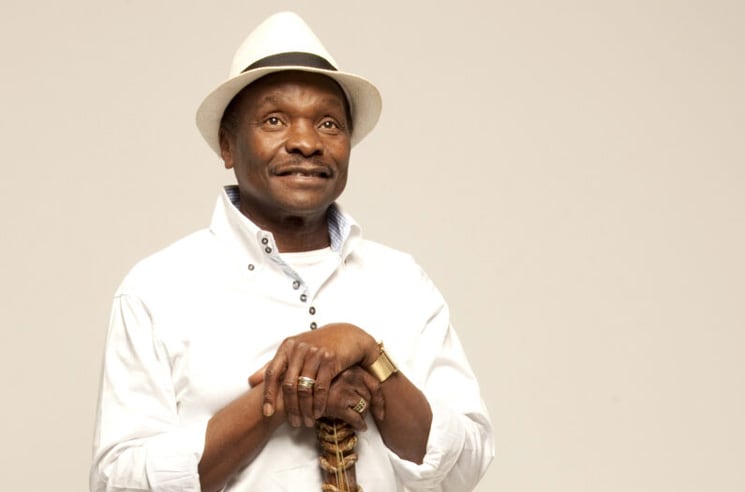Mory Kanté — an acclaimed West African vocalist and musician known internationally for 1987 hit "Yé ké yé ké" — has died. Kanté's son, Balla Kanté, told Agence France-Presse that he passed in Conakry, Guinea, as a result of chronic health issues. He was 70.
"He suffered from chronic illnesses and often traveled to France for treatment, but that was no longer possible with the coronavirus," Balla told AFP. "We saw his condition deteriorate rapidly, but I was still surprised because he'd been through much worse times before."
Femi Kuti called Kanté "a wonderful great musician" in tribute today, writing that "his great hits set the dance floor on fire and will live forever as will he."
Senegalese musician Youssou N'Dour called the late artist "a baobab of African culture," while president of Guinea, Alpha Condé, praised the late artist's "exceptional" career.
Born in the town of Albadaria, Guinea, in 1950, Kanté was the son of well-known griot musicians El Hadj Djeli Fodé Kanté and Fatouma Kamissoko. At age seven, he was sent to Mali to learn vocals and the kora harp, which would become his primary instrument.
At age 21, Kanté would join Mali's Rail Band in 1971, becoming the group's vocalist upon the departure of Salif Keita. He would make a move to Paris in 1980, and would make his solo debut with a self-titled album in 1982, earning himself the nickname "the electronic griot."
Kanté would achieve international recognition in 1987 with "Yé ké yé ké." Released as a single from his third studio album, Akwaba Beach, the song was the first African single to sell more than one million copies, and became a top five hit in France, Switzerland, Germany and the Netherlands.
Kanté's most recent studio album is 2012's La Guinéenne. In 2014, he teamed with Keita, Oumou Sangaré, Kandia Kouyaté, Tiken Jah Fakoly, Didier Awadi and more for charity single "Africa Stop Ebola."
When asked by The Guardian how he would like to be remembered in a 2004 interview, Kanté answered, "As a man of culture, as a citizen of the world who delivers his messages in music, and as a tireless traveller looking to meet and know the people of this world."
"He suffered from chronic illnesses and often traveled to France for treatment, but that was no longer possible with the coronavirus," Balla told AFP. "We saw his condition deteriorate rapidly, but I was still surprised because he'd been through much worse times before."
Femi Kuti called Kanté "a wonderful great musician" in tribute today, writing that "his great hits set the dance floor on fire and will live forever as will he."
Senegalese musician Youssou N'Dour called the late artist "a baobab of African culture," while president of Guinea, Alpha Condé, praised the late artist's "exceptional" career.
Born in the town of Albadaria, Guinea, in 1950, Kanté was the son of well-known griot musicians El Hadj Djeli Fodé Kanté and Fatouma Kamissoko. At age seven, he was sent to Mali to learn vocals and the kora harp, which would become his primary instrument.
At age 21, Kanté would join Mali's Rail Band in 1971, becoming the group's vocalist upon the departure of Salif Keita. He would make a move to Paris in 1980, and would make his solo debut with a self-titled album in 1982, earning himself the nickname "the electronic griot."
Kanté would achieve international recognition in 1987 with "Yé ké yé ké." Released as a single from his third studio album, Akwaba Beach, the song was the first African single to sell more than one million copies, and became a top five hit in France, Switzerland, Germany and the Netherlands.
Kanté's most recent studio album is 2012's La Guinéenne. In 2014, he teamed with Keita, Oumou Sangaré, Kandia Kouyaté, Tiken Jah Fakoly, Didier Awadi and more for charity single "Africa Stop Ebola."
When asked by The Guardian how he would like to be remembered in a 2004 interview, Kanté answered, "As a man of culture, as a citizen of the world who delivers his messages in music, and as a tireless traveller looking to meet and know the people of this world."
